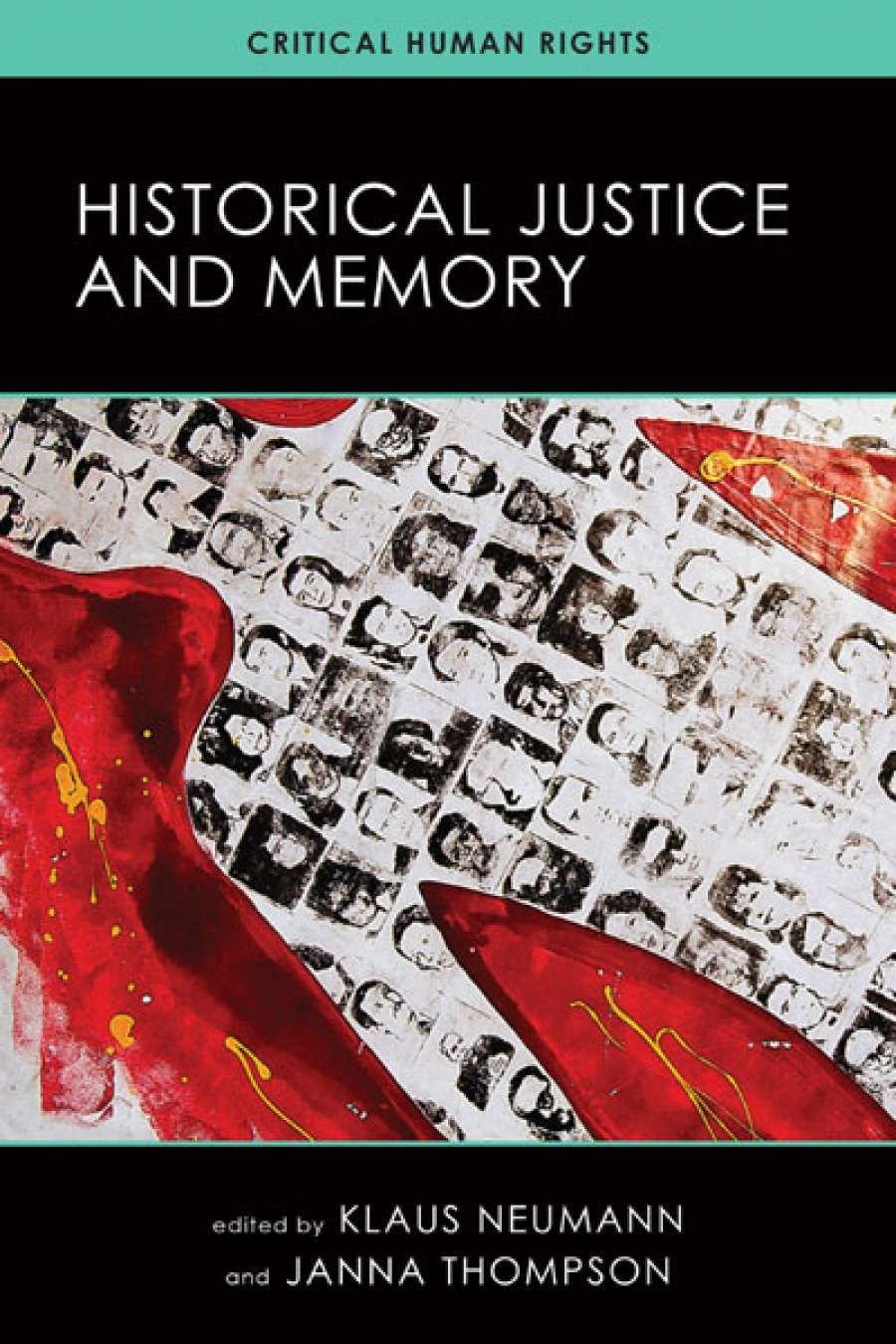
- Free Article: No
- Contents Category: Philosophy
- Custom Article Title: Ian Ravenscroft reviews 'Historical Justice and Memory' edited by Klaus Neumann and Janna Thompson
- Book 1 Title: Historical Justice and Memory
- Book 1 Biblio: University of Wisconsin Press, US$39.95 pb, 265 pp, 9780299304645
In some cases, public memory leads to memorialisation. Memorials can serve several functions: they can constitute an apology that is, so to speak, expressed in stone, remind us of past events, promote recognition of victims, call on us to accept our own responsibilities, advocate reconciliation. There is a memorial at Myall Creek that serves many of these important functions. But memorialisation can also focus antagonism by emphasising the conflicting memories of rival groups.
Memory is one of two main strands in Klaus Neumann and Janna Thompson's collection, the other being historical justice. The massacre at Myall Creek was a travesty of justice both for the victims and their community. That much is uncontroversial. But what about the descendants of victims and community? Is there a further injustice involving them? To what extent are the descendants of historical justices owed an apology or reparation? Questions of apology and reparation are the focus of several papers in this collection, but a number of important questions are not adequately addressed.
To begin with, we can ask whether the demands of justice weaken or expire over time. In 1241, Mongolian troops devastated the states that comprise modern Poland. Does Mongolia owe apology or reparations to Poland nearly 800 years later? Some authors have suggested that aggressors owe reparation to the extent that the descendants of the victims are worse off because of the aggression. But how is the impact of the aggression on the descendants of the victims to be calculated? Finally, the passage of time tends to erase the evidence on which any apology or reparation will be based. In the case of the Holocaust, the evidential base is massive; in other cases it is open to dispute. How firm does the evidence base have to be? Should reparations be discounted when the evidence is weak?
In her contribution, Thompson thinks through an issue that has been a focus of discussion in the historical justice literature. Political philosophers like John Rawls argue that, subject to constraint, a just society is one in which resources are evenly shared. Reparations for historical justice may interrupt this pattern since, once the reparations are paid, some citizens will have more resources than others. It is therefore not surprising that leading theorists in the 'justice as equality' tradition reject reparation, although some rather grudgingly accept the idea of apology.
'What is at stake is the reliability of memory – not merely in the sense that individuals' memories are fallible, but also in the wider sense that public memories are contested'
Thompson is clear that she does not want to ignore the demands of equality, but nor does she want to rule out recompense for historical injustices. This raises the problem of adjudicating between claims of equality and claims of historical justice. She dismisses – too quickly in my view – the possibility of locating an overriding principle or principles that would allow adjudication to take place, advancing instead the idea that the claims of equality and historical justice can be balanced by fair dialogue between parties who respect each other's interests. But this seems naïve: when the stakes are high, few are willing to put aside their own interests. Indeed, it may be that dialogue would simply entrench pre-existing positions.
'Leading theorists in the ''justice as equality'' tradition reject reparation, although some rather grudgingly accept the idea of apology'
One way to conceive of historical injustice is in terms of human rights violations. In his contribution, Andreas Huyssen draws attention to the central role the Holocaust played in the formulation of the Universal Declaration of Human Rights. The Holocaust functioned as a paradigm of human rights violation, a paradigm whose lessons could be applied universally. Huyssen's concern is that universalising human rights in this way risks obscuring significant historical and local details of injustices. But while universality can ride roughshod over local understandings of events and norms, abandoning universality is deeply problematic in ways the Holocaust clearly enunciates. The Universal Declaration of Human Rights sought amongst other things to defend minorities against racial 'truths' peddled by totalitarian regimes. In the Nazi case, those 'truths' were deeply embedded in the prevailing culture, but that does not mean they should be treated with respect. Universalising human rights provides a mechanism for asserting the moral claims of the vulnerable.
The Myall Creek atrocity is only one example of a vast injustice committed on the indigenous population by white invaders. We need to remember such injustice and push for adequate apology, reparation, and reconciliation. The scholarly work exemplified in Historical Justice and Memory can inform and guide this important national project.


Comments powered by CComment